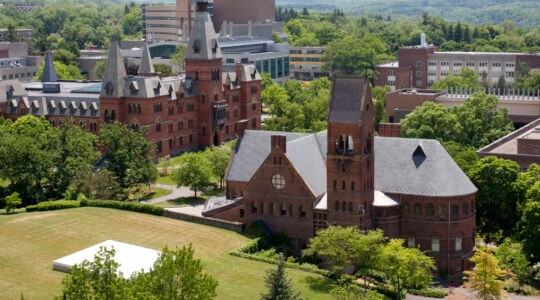TEL AVIV (JTA) – Israel is turning 60, but few here seem in the mood to crack open the champagne.
Israelis are still gloomy about the country’s perceived failures in the 2006 war with Hezbollah in Lebanon, and every day brings fresh reminders that no solution has been found for the growing problem of cross-border rocket fire from the Gaza Strip.
“I don’t see Israel as a failure, but what makes this anniversary less of a celebration is that we cannot proclaim a happy ending,” veteran Israeli journalist Nahum Barnea, a columnist for the daily Yediot Achronot, told JTA. “We did not reach a point that we can say, ‘OK, the period of state building is finished and now we can live happily after.’ “
The contradictions of life here can be painful. Israel has an outwardly robust economy that produces high-tech giants but also a record number of people living in poverty. There is a feeling of security that has come with a decline in terrorism-related deaths, but also a widespread resignation that peace remains a distant dream.
All this, to say nothing of government corruption, one of the problems most troubling Israelis.
“I don’t feel very festive,” said Shaanan Street, the lead singer of the popular Israeli hip-hop band HaDag Nachash, shortly before taking the stage at a Tel Aviv club Tuesday. “Israelis are not too happy. They are worried instead about the next war and how they are going to finish the month.”
In a country where one in three children lives in poverty, there has been grumbling about the $28 million the government has budgeted to mark the country’s 60th birthday, even though some of the money is earmarked for educational and infrastructure programs.
Meanwhile, many say, the list of celebratory events is a bit of a snooze.
Aside from the bigger-ticket items like local fireworks shows, a huge dance party in Tel Aviv’s Yarkon Park, and sound and light shows, scheduled events include a concert titled “Military Orchestras Playing Peace” and the display of the world’s largest Israeli flag, measuring 656 feet high and 320 feet wide.
The week after the anniversary, President Shimon Peres is also hosting a conference with a star-studded guest list on the future of the Jewish people.
Israel at 60 is a modern-day Sparta and Athens, Barnea says, walking a fine line in its dual existence as both a garrison state and a thriving cultural and business locale.
“It’s not easy to live successfully in these two worlds at the same time,” Barnea says.
Gidi Grinstein, a former Israeli negotiator who runs an independent think tank in Tel Aviv, the Reut Institute, agrees.
The national mood, he said, exists in “tension between exuberance and concern because Israel is a country that offers very polarized performances on a number of levels.”
“Let’s start with socio-economic,” he said. “According to certain indicators, we are world leaders in research and development, and ranked in the Top 10 in the world in terms of business and technology. And at same time, other sectors are badly underperforming, like education and law enforcement and the entire government structure, which is in crisis.”
Grinstein, who advocates structural reform of the government to make it less beholden to sectarian interests, asks which Israel will prevail in the next 60 years, “the Israel of excellence or the Israel of mediocrity?”
A recent Haifa University poll of Israeli Jews found their faith in state institutions at an all-time low. Fewer than half those surveyed, 48 percent, said they have faith in the Supreme Court, 15 percent said they had faith in the police and just 9 percent said they had faith in the government.
Mitchell Barak, who heads Keevoon, an Israeli research firm in Jerusalem, says recent surveys conducted by his firm show Israelis are more concerned with corruption than with threats from the Arab world.
On Tuesday, former Israeli President Moshe Katsav turned down a plea bargain offer that would have required him to admit to sexual misconduct in exchange for the dropping of a possible indictment against him on more serious charges, including rape. Katsav now may face those charges and go on trial.
“We are seeing a significant rise in people who’ve had it with their elected officials,” Barak said.
Ben-Dror Yemini, a columnist for Ma’ariv, says Israelis do not know whether the government has viable plans to deal with the country’s ongoing threats, both external and internal.
“They don’t have the slightest idea about what is really going on,” he said.
Eti Doron, a toy store owner in Tel Aviv, says a weariness has descended upon Israelis.
“There is a feeling of being down. People are not sure what is happening with the country,” she said. “Socialism has disappeared, the corruption is worrisome and our leaders are power-mongers.”
A nearby grocer, Danny Horvitz, sounded a different note as he packed bags at his small store.
“Overall I feel positive,” he said. “There is corruption here but overall things are good. Israel will be here in 60 years and it will be even stronger. There will be a deal by then with the Palestinians.”
Horvitz paused before adding, “That is what I hope for, at least, and that things will be good for both us and them. Otherwise, neither one of us will be here.”

Help ensure Jewish news remains accessible to all. Your donation to the Jewish Telegraphic Agency powers the trusted journalism that has connected Jewish communities worldwide for more than 100 years. With your help, JTA can continue to deliver vital news and insights. Donate today.





